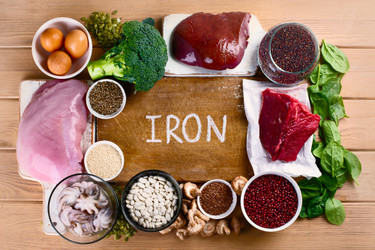Iron Deficiency and Periods
Posted by Wombilee on Dec 1st 2024

Don't we all feel like lying on the bed when our periods arrive? It's normal until the first day of your period hits you with illness symptoms that let you get nothing done. We must look out for these symptoms, as the most common culprit is iron deficiency. The leading cause of iron deficiency is heavy menstrual bleeding or menorrhagia. It reduces the iron stored in our body, which we all know is the fundamental element of hemoglobin.
In menorrhagia, you might run to the washroom to change your pad/tampon every hour for over a week. The cramps that come with it are just another painful component; they are so severe that they have been given a name of their own: dysmenorrhea.
Why do some women face heavier menstrual bleeding?
Every woman indeed has a different flow; some experience light flow, while there are women who dread their periods because of the heavy flow, which brings added pain. Trust us when we say an average woman bleeds about three tablespoons in one period, whereas someone with a heavy flow will be bleeding twice the amount. Sometimes, you may be having a naturally heavy flow, but most of the time, there's some hidden factor which can be:
• Polycystic Ovary Syndrome (PCOS): It messes with the hormones in your body, which triggers it to thicken the uterine lining for months. So, when you finally get your periods, they are heavy, painful, and full of clots.
• Uterine fibroids: Fibroids are tumors in the uterus which can be the size of a seed to bulky masses. The most common symptom of these fibroids is heavy bleeding.
• Intrauterine Device (IUD): A birth control measure that fits the uterus and can cause heavy bleeding side effects in some women.
• Adenomyosis: A condition in which the endometrial tissue grows in the muscular wall of the uterus instead of the lining of the uterus. Therefore, it bleeds in the muscular wall, which causes hefty bleeding with pain.
• Other factors: There are other factors, such as miscarriages, hormonal changes, pelvic diseases, uterine polyps, and kidney diseases, which can cause heavy bleeding. At times, some medications can also trigger your flow.
The first thing you need to do is get to the core reason for heavy periods. Once that is treated, your iron storage will improve, as you only lose your iron when you bleed excessively.
How can heavy bleeding lead to iron deficiency, and what are the symptoms to look for?
Hemoglobin is a protein in red blood cells that carries oxygen to our body's organs and tissues; in reverse, it also takes carbon dioxide from those organs to our lungs. It is safe to say this is one of the essential elements in our body. Iron deficiency means a low hemoglobin level, and one of the significant factors that causes this is heavy menstrual periods.
When there is heavy bleeding, we lose more red blood cells from our body, and our iron storage becomes less. Now, if you already have less iron, you become iron deficient; for instance, if you were already iron deficient, you will have iron deficiency anemia. There are a lot of symptoms of iron deficiency that you can feel, but the most common are:
• Extreme fatigue
• Dizziness
• Severe headaches
• Pale skin
• Shortness of breath
What can you do to prevent and treat iron deficiency during menstrual periods?
It is crucial always to be alert for any changes in your body, as this can help you cure any underlying disease in time. Like any other illness, iron deficiency can be cured by changing your diet if caught in time. But if it surpasses anemia, you must add supplements prescribed by your physician.
The best way is to add more iron-rich foods to your diet, especially during your period. There are a lot of iron-rich foods that you can add, such as:
• Meat
• Eggs
• Iron-fortified cereals
• Beans and lentils
• Beetroot and spinach
• Cashew nuts
• Dried apricots and dried peaches
• Dates
Pro-Tip: Vitamin C in your iron-rich foods will help your body absorb that iron much more easily and in higher content. This is a golden tip that only some are aware of. Add citrus fruit, tomatoes, strawberries, or any other Vitamin C food to your meal. Limit your dairy and caffeine intake, especially at least 2 hours before and after your iron-rich meal.
If you can't add these foods to your diet for any reason, you can talk to your physician and get prescribed iron supplements according to your age and deficiency. Your physician will ask you to take a complete blood count (CBC) test to check your levels before prescribing anything.
Conclusion
With our fast and busy lives, keeping track of our bodies is sometimes impossible, and we tend to ignore our health issues. Therefore, it is advised to get a CBC test along with a few other tests every six months to check your levels and overall health. If you face any of the symptoms mentioned above, talk to your healthcare provider as soon as possible and find the best treatment for you!

